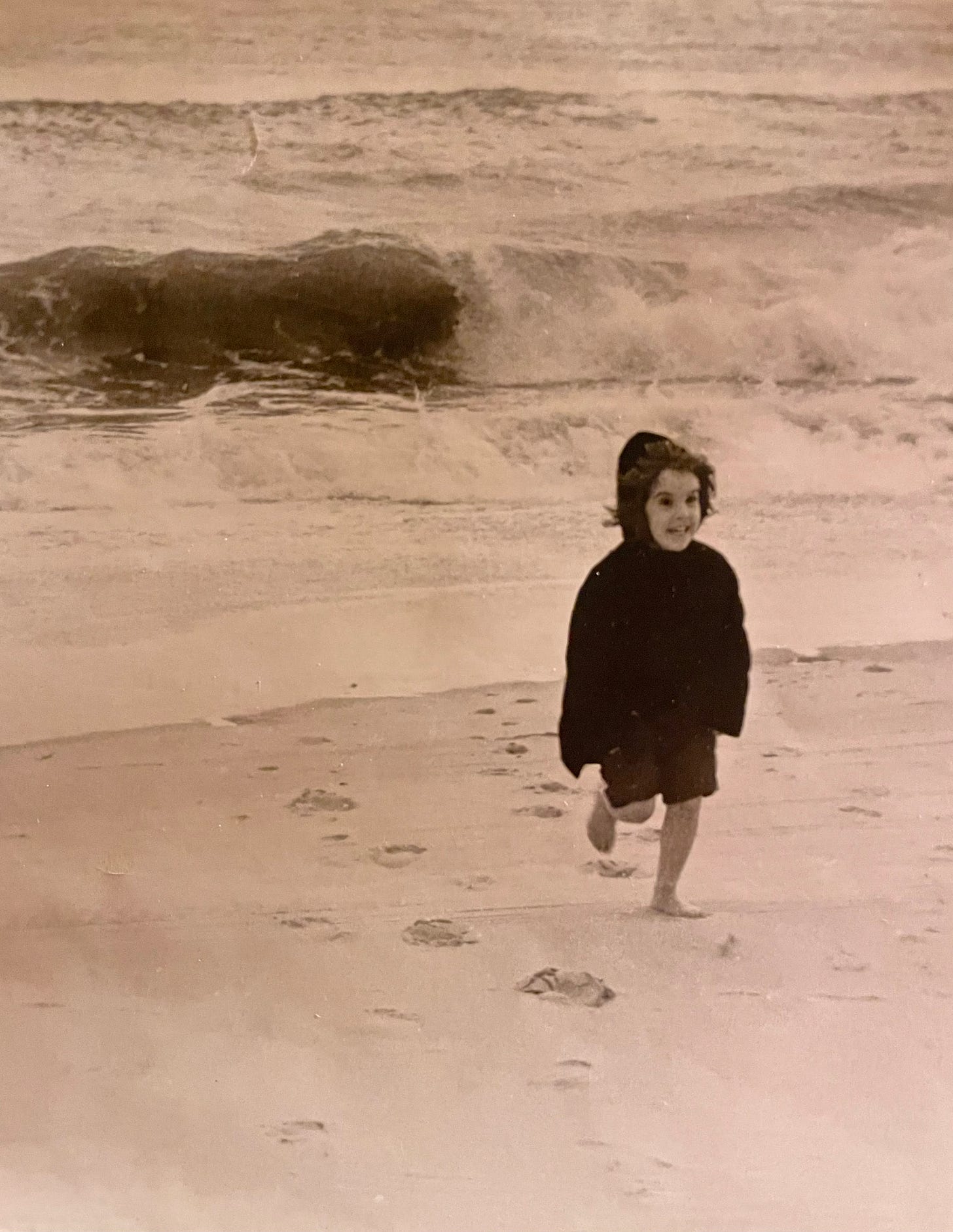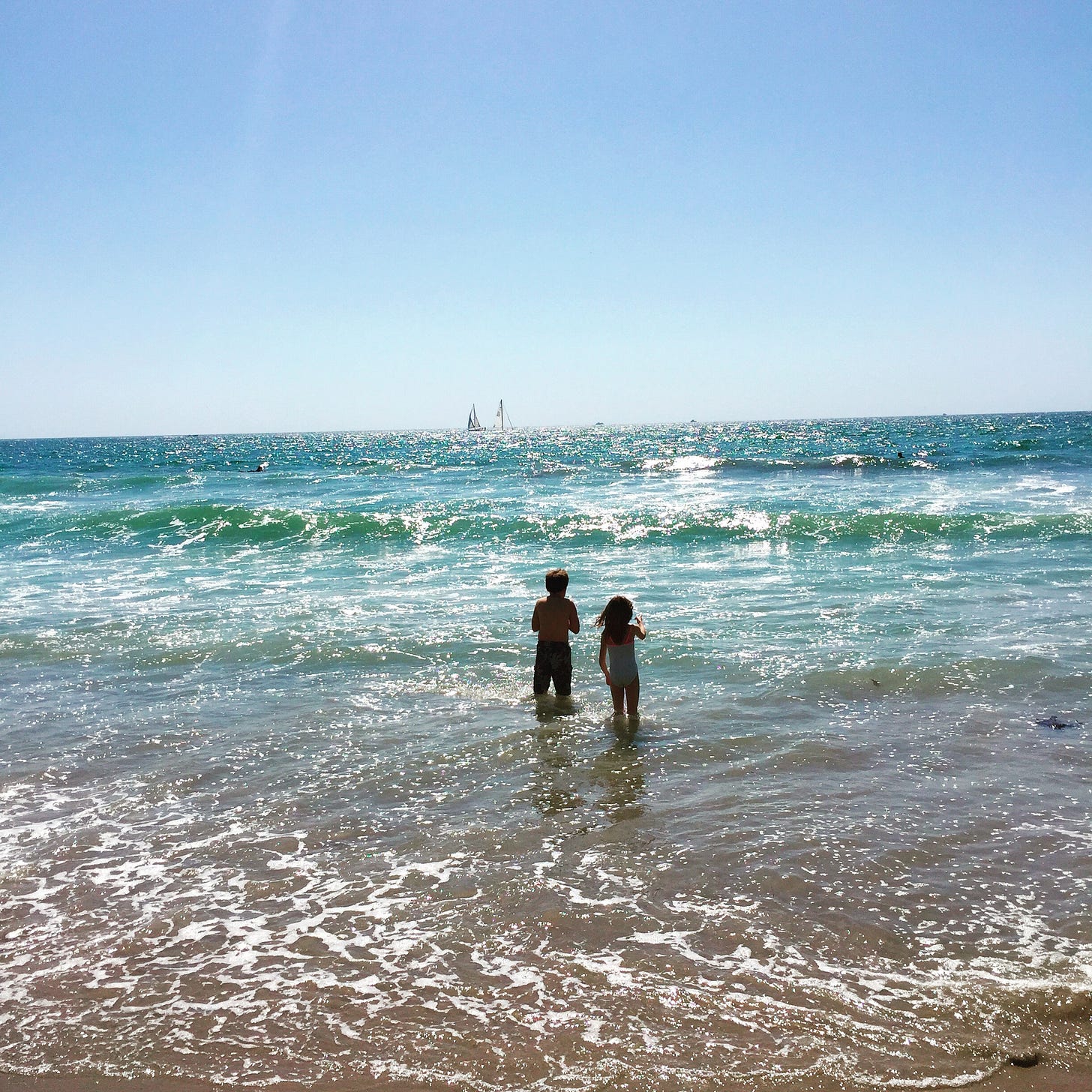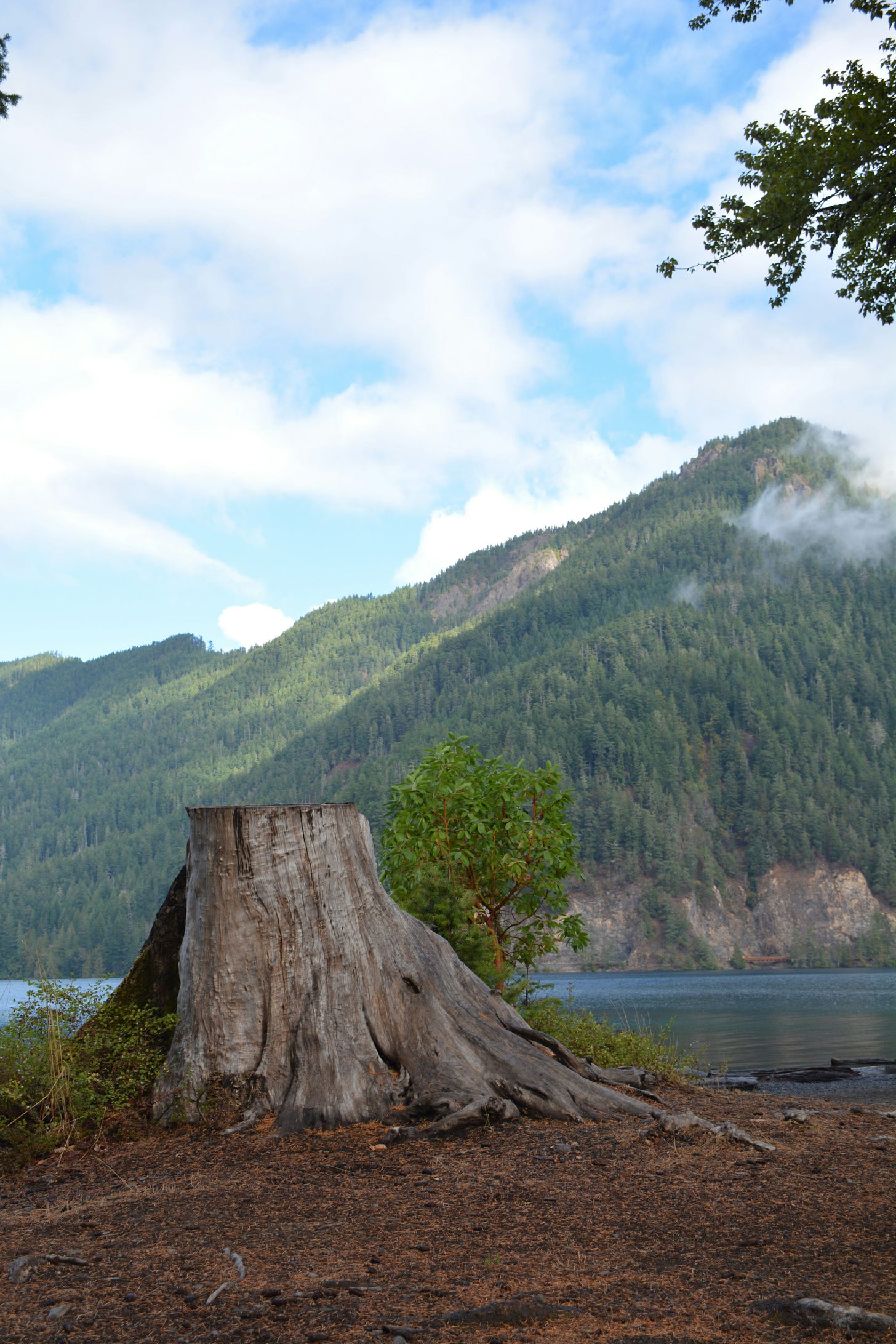People Who Love You
Want you to be safe
Some things stay with you. I remember being little - I couldn’t have been more than four - and creeping down to the kitchen in my grandmother’s house at the Jersey Shore. We’d go there for the summers. It was my favorite place to be. My grandma - my Nanny as I called her - would hear me on the stairs. They were old and wooden, and they’d creak even if you stepped as lightly as you could. Salt air had seeped into everything, the stairs, the lace curtains that fluttered in the breeze, the macrame rugs she’d made. Her tomato plants climbed up the outside wall along the side of the house where she grew basil. She’d make tea in a pitcher and let it steep outside in the sun.
I’d wake up before everyone when I was little. At home the rule was I had to stay in bed, but I could read or draw as long as I was quiet. At Nanny’s house the rules were different. I’d climb out of bed and pull a sweater over my nightgown. Then I’d tiptoe to the door, and down the steps carefully, one at a time, holding the bannister. She’d pop her head out of her bedroom door at the bottom of the steps, and she’d look so excited to see me, like she hadn’t just seen me the night before. Like she hadn’t put me to sleep by humming softly, rocking back and forth, tracing circles on my face, around my cheeks and eyes, across my forehead.
I’d get to that bottom step and she’d lift me off my feet and wrap her arms around me. I’d hug her back as tightly as I could. The smell of rosewater still stops me in my tracks. We’d whisper so we didn’t wake the whole house, and she’d grab my jacket off the hook. Pull her own jacket on, grab a blanket and take my hand like we were going on an adventure, which we were. We’d head out the door and cross the street, heading for the beach. Her house was a few blocks from the Seaside Heights Amusement Park, but at 5am, things were quiet. We’d whisper as we walked, too, because she taught me how sound gets carried on the wind. Most mornings it was just us on the beach.
She’d lay the blanket down on the sand, and we’d cuddle up tight to watch the ocean waves crashing against the shore, the seagulls cawing overhead, and, eventually, the rising sun. Sometimes I’d run toward the waves and then back, seeing how close I could get without getting my feet wet. Sometimes she’d tell me stories about my mom, when she was a little girl. What I remember the most was the way she looked at me, like I was the best thing in the entire world.
I remember feeling safe.
My Nanny is one of the markers in my life. Before Nanny died. After Nanny died.
After Nanny died everything kind of went to shit, but I’ve written about that a lot so you probably know. If you’re new here, everything went to shit after my Nanny died. Now you’re caught up.
The thing is, I carry her in my heart like some kind of map. Like every way she loved me got folded up and tucked away for safekeeping, so when I had my own children I would know how to do what she did. How to make the world feel safe and beautiful. How to meet my children each morning with excitement and joy, and this feeling that we were sharing the best kinds of secrets. Understanding that just being here together on this spinning planet at the same time was incredible enough for any day, and because of that no day was normal or boring or run-of-the-mill.
We live blocks from the ocean, and not far from the amusement park at the Santa Monica Pier. I didn’t do this on purpose, I didn’t intend to find a place that would remind me of the place I felt safest in my life, but I’m also sure it’s no accident that I could take a blanket down to the beach tomorrow and watch the sunrise. I could hear the waves crashing, the seagulls cawing overhead. My kids grew up with those same sounds. They know the feeling of wet sand between their toes, the smell of the boardwalk after the rain, the sounds of people screaming at the top of the rollercoaster, right before the fall.
I kept the world safe for them as long as I could. Our house was peaceful and joyful and full of fun. At night, I read to them for hours sometimes, tangled up in my bed under blankets, their limbs flung over me like we were some kind of three-headed, twelve-limbed creature hungry for good stories, great sentences, adventures in far-flung places. I bought the books I’d loved as a child - Shel Silverstein’s Where the Sidewalk Ends, A Light in the Attic, Falling Up, and The Missing Piece Meets the Big O. I did not get The Giving Tree, but I’ll get back to that in a moment.
I got The Classic Treasury of Aesop’s Fables, Where the Wild Things Are, Pierre, and In the Night Kitchen. I also got newer books, like Leonardo, the Terrible Monster and Knuffle Bunny, A Cautionary Tale. As they got older, the books changed. Sometimes I’d read to them from grown-up books like A Man Called Ove. I chose books like I was unwrapping treasure for them, which I was.
My son was six when Sandy Hook happened, my daughter was four. When news came out that day, I was home, about to head to the grocery store before it was time to get my daughter from preschool. I sat down on the couch and sobbed. My heart shattered for those families, for those babies in their classrooms, for the parents who would have to explain it, somehow, to the siblings of children who wouldn’t come home that day, or any other day.
My heart broke many times over the next few weeks. It broke when I opened the closet door in my bedroom and saw the wrapped gifts I had hidden for my kids, and realized in horror that parents in Newtown had wrapped gifts for their children, too. It broke again when I saw the parents on the news, stricken, hollowed out, bereft. It has never fully unbroken.
Now my oldest is in college and my youngest is a sophomore in high school, and they are not confused about the world. The world exists far beyond the walls of our house, and even before it did, I had started explaining things to them as best I could. I got Howard Zinn’s A Young People’s History of the United States so there wouldn’t be any confusion about the true story of Thanksgiving, whether Columbus was a good guy, or how slavery, racism and sexism were woven into the fabric of this country no matter what The Declaration of Independence might say.
I made sure they knew the 19th Amendment granted white women the right to vote in 1920, and that all other women had to continue to fight for the rights white men had been granted freely, from the beginning. I made sure they understood women could not have their own bank accounts or credit cards until 1974. I thought if they were armed with this information, if I could tell them first and talk to them about it, it might soften the blow. It felt better than nothing, but not nearly as good as it would have felt to live in a world that doesn’t break your heart. And then break it some more.
I mentioned The Giving Tree earlier, and how I didn’t read it to my kids when they were little. I’m going to guess you know the story, but if you don’t, the most abridged version is this: There was a beautiful apple tree and a boy, and when the boy was little he loved the tree, but as he got older he only visited the tree when he needed something. He took her apples and sold them for money, he took her branches and built himself a house, he took the better part of her trunk and made a boat to sail away. In the end, he returned, and what was once a majestic tree was just a stump, and all she could offer him was a place to rest his bones. He was old, alone and unhappy, and he’d taken every last thing the tree had to offer, even her joy. The boy kept asking for more, she kept saying yes, and at no time did he thank her. The End.
My dad used to read it to me when I was a kid, and it depressed the hell out of me, even then. I would end up in tears every time, and he would argue with me and say the tree was selfless and generous and happy to give everything she had to the boy, because that’s what love is. I’ll skip the part about how totally self-absorbed my dad was, and how it’s easy for me to see now that he was the boy, and every woman in his life was the tree. I couldn’t have understood that as a child, but I did know the boy had asked for too much, and the tree should have set some boundaries.
Healthy love does not deplete you. It is not all give and take, where one person does all the giving and the other all the taking. Love flows freely between two people, or it does not. That doesn’t mean it’s always equal - everyone goes through chapters when they might need a little extra help - but through the course of time, there ought to be a pretty good balance. And if someone is giving you everything they can, some gratitude and appreciation are in order.
There’s an Aesop’s Fable I used to skip reading to my kids as well, about The Wolf and The Crane. It’s a weird one. There’s a wolf in a forest and he’s eating some prey, who knows what kind, and he gets a bone stuck in his throat. He coughs and howls, rears up, runs in circles, chases his tail and does every last thing he can to dislodge it, with no success. He’s in agony when a crane comes by. She’s described as kind-hearted, which is going to matter in a minute. He explains his predicament and begs her to help him. He says he’ll “make it worth her while,” and that is so odd I don’t know - and never have known - what to make of it. But she puts her slender beak down his throat and carefully extracts the bone.
The wolf is thrilled and grateful and thanks her wholeheartedly. The kind-hearted crane is pleased to have helped and starts to leave, but then she stops. She asks where her reward is. Now, I know he said he’d make it worth her while, but if she’s so kind-hearted, shouldn’t she want to dislodge the bone? It takes her a matter of seconds, she’s not even going to be late for pickleball, so I’m not really getting this whole transactional thing that’s happening. Isn’t the reward that she saved his life? Imagine you’re at a restaurant and someone starts choking and you run across the room and give them the Heimlich maneuver. You save their life, they thank you, the other restaurant-goers clap, and then you … ask for a prize? I don’t think so.
So the wolf gets pissed and says the reward is that I didn’t eat you. You got to stick your head down my throat and you’re living to tell the tale, you’re welcome. And the crane goes off in a huff, dissatisfied with the wolf’s original expression of gratitude and wholly aggravated by his follow-up snark. And the moral of the story is that it’s noble to do good deeds, but not everyone will appreciate them, so maybe save your good deeds for people who will thank you enough. My response to that is…yikes?
There are people spending time with family members today who may have just voted against their right to exist freely and openly, and that’s painful and heart-wrenching. And some of these family members will not want to hear it. They’ll want to be fed, they’ll want to sit around a table and enjoy the holiday, and not hear anything about why one of their relatives may be having a hard time passing the gravy this year.
Maybe they’ll be something like the boy from The Giving Tree, they’ll just want to take all the good stuff until there’s nothing left but the stump of a person they claim to love, so beaten down they have nothing to offer but their silence. Or maybe they’re like the wolf or the crane, because honestly, neither one of them seem to be getting the gratitude message. The wolf is weirdly transactional, and probably like those family members who keep lists of ways they’ve been wronged by everyone at the table dating back to 1974, or maybe they’re like the crane, never quite satisfied with the amount of gratitude being expressed.
Only if you’re lucky will you find yourself seated next to a Nanny. The family member chosen or otherwise, who loves you fully for you. Who sees you clearly and thinks you’re the best thing in the whole entire world, just as you are. The one who wants to make the world safe and beautiful for you. The one who understands gratitude every day of the year. I wish that for you with my whole heart. If I could snap my fingers and make the world safe and beautiful for all of us, I would. I wish I could. Short of that, I wish you a very Happy Thanksgiving. I’m grateful for you, from the bottom of my heart.
Friends, I’m sending you so much love today and every day. If you’d like to meet me in real time to talk about gratitude, love, and all things that should never be transactional, I’ll be here 11/29/24 at 11:15am PST, or you can wait for the podcast version which will go out on Saturday as usual. Also, the Early Bird Special for my Croatia retreat ends at Midnight PST this Sunday December 1st. How is it December. Lastly, I found the film of the Seaside Heights Amusement Park on YouTube (linked in the essay) and it made me cry. I don’t know the people in the film, but it’s from 1975, and I could have walked right by. Have a look if you feel like it. Much love xx





I am Nanny to Poppy and Gus. My only aim is to make them always feel as you did with your Nanny, ♥️♥️
Girl, I feel like you and I would sit down and have a bottle or two of wine and trade war stories and some of them would be terrifyingly similar. Everything went to shit when my grandmother died too, so I felt this in my bones. This was beautiful.